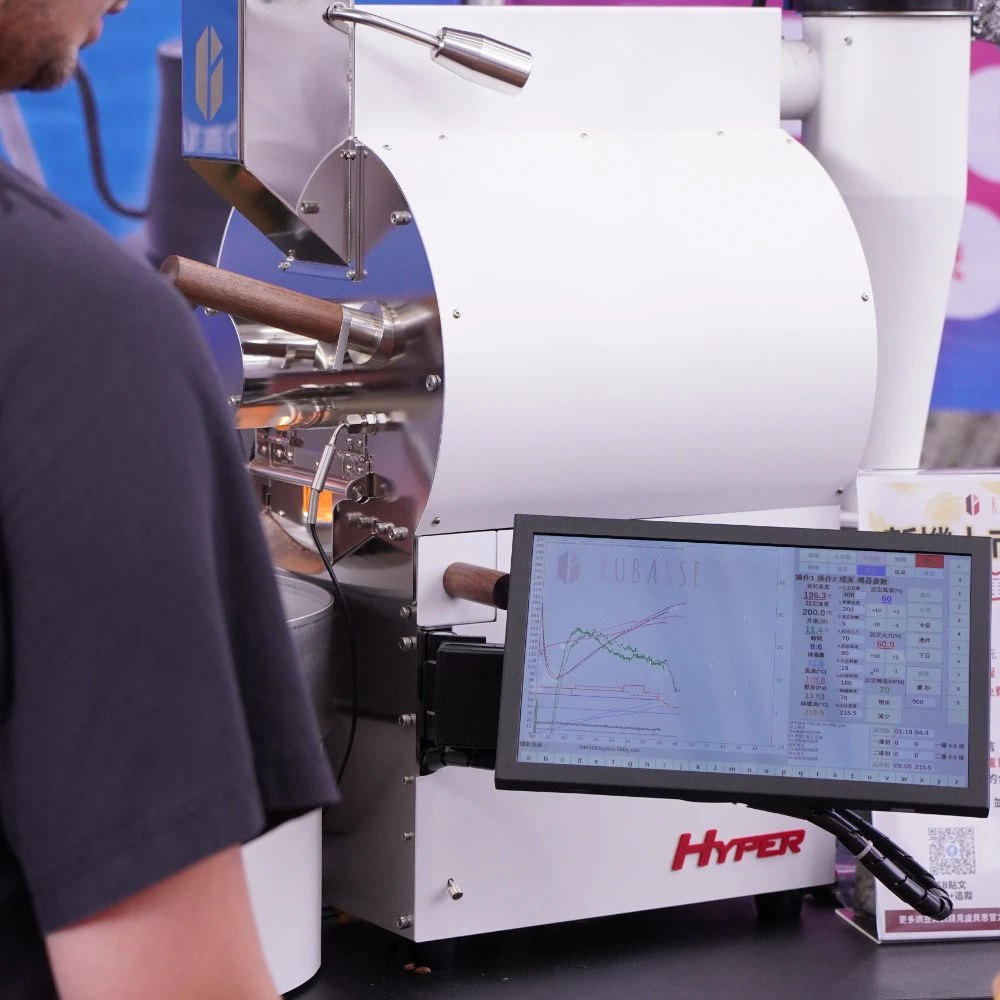
Electric Coffee Roasters: Why We Use Them, Recommend Them, and Trust Rubasse
At Bay Coffee Roasters, we’ve spent years refining our approach to coffee roasting. We know that the best coffee beans mean nothing without the right equipment—and in our experience, electric coffee roasters offer a level of control, consistency, and sustainability that simply can’t be matched.
We’ve always roasted electric. In fact, our journey began with a DIY build—we built our very first electric coffee roaster using ceramic heating elements. It was basic, but it worked, and more importantly, it helped us understand how heat moves through coffee. That hands-on start shaped everything that followed.
Today, we’re proud to be the official UK distributor for Rubasse—a company at the cutting edge of electric roasting innovation.
But our relationship with Rubasse goes far beyond just supplying machines. We've travelled to their factory in Taipei, spent time on the ground learning their approach to engineering, and worked alongside their team at World of Coffee in Copenhagen, where one of their own competed in the World Coffee Roasting Championships. We’ve provided direct feedback that’s helped shape improvements in their machines—something not many roasters can say.
Being part of their team inspired Jules from our roastery to train with the Coffee Quality Institute, where she qualified as a Q Grader—an important step in sharpening our quality control and sensory skills.
We also use Rubasse’s Roast Master 3kg and Roast Pro models daily in our own roastery, relying on them for both production and profile development.
Why Choose Electric Coffee Roasters?
1. No Need for Gas Installations Forget gas lines, permits, and complex ductwork. Electric roasters simplify setup—especially in small spaces or urban areas—making roasting more accessible and scalable.
2. Lower Emissions, Better Sustainability Electric coffee roasters eliminate fossil fuels and lower your carbon footprint. With Rubasse’s NIR heating system, energy is targeted where it’s needed, making it cleaner and more efficient than conventional roasting.
3. Total Control, Better Results Electric systems—especially Rubasse’s—allow precise adjustment of airflow, drum speed, and power. The Near-Infrared heating technology ensures an even roast from core to surface, giving you full command of flavour development.
4. Energy Efficiency Rubasse’s machines are built to save energy. The Micro 3kg roaster uses just 1kWh per batch, and all models eliminate the waste heat common in gas-powered systems.
Rubasse Hyper 1.2kg: Big Performance in a Small Package
The new Rubasse Hyper 1.2kg coffee roaster is ideal for cafés, startups, and roasters who want serious roasting power in a small footprint. It combines stylish design with advanced features, including:- Near-Infrared (NIR) Heating – Uniform, deep heat penetration - Multi-angle Touchscreen – Intuitive, space-saving controls - Auto-Pilot Profile Replication – Consistency from batch to batch - Real-Time Roast Data – Moisture tracking, temp curves, airflow, and more - 230V Plug-and-Play – No gas, no fuss, just roast
It’s a perfect entry point for anyone serious about quality and sustainability.
We’ve never used gas roasters. From day one, we’ve relied on electric—and that hasn’t changed. We built our first machine ourselves, then gradually moved to more sophisticated systems as we grew.
Today, we use both the Rubasse Roast Master 3kg and Roast Pro for all our roasting—whether we’re running production for cafés or developing new profiles. For darker roasts, we use electric fluid bed roasters, which deliver the airflow and power we need, without leaving electric behind.
Our setup is 100% electric, and that’s by choice—not compromise.
Electric Coffee Roasters – Common Questions
Q: Are electric coffee roasters as good as gas roasters?
A: Yes. In fact, we believe they’re better. Electric roasting gives you greater heat stability, cleaner flavour development, and easier installation.
Q: Do I need special power supply?
A: Smaller models like the Hyper 1.2kg use a standard 230V UK socket. The Roast Master 3kg requires a 32-amp connection—still much simpler than gas installation.
Q: Can I roast commercially on electric equipment?
A: Absolutely—we do it every day. We roast for wholesale clients, events, and online orders entirely on electric machines.
Q: What about darker roasts?
A: For bolder profiles, we use electric fluid bed roasters alongside our Rubasse drum roasters—still fully electric, with the power to develop deeper flavours.
Q: How does NIR roasting work?
A: NIR (Near-Infrared Radiation) heats coffee beans directly and evenly, penetrating into the core of the bean. It offers incredibly even development, compared to the external-focused heating of traditional hot-air roasters
